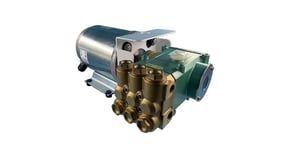Benefits of Multipoint Chemical Injection Pump Systems

Shawn Glover, VP of Sales, Dec 21, 2021

Chemical metering is a desirable feature for many pump applications that require precise dispensing of solvents and other fluids.
When an application requires the metering of multiple types of chemicals or fluids, a multipoint injection pump system is in order. What should you look for in a multipoint chemical injection pump system, and are there different types of metering pumps for various industries? Let’s dive in.
Injection Pumps vs. Dosing Pumps
Before we get into what sets a multipoint system apart from a regular pump, it’s important to point out that within the chemical metering family of pumps there are two subcategories: injection and dosing. There are those who use the two terms interchangeably, but there are critical differences.
Chemical dosing is used to release a designated amount of fluid into a tank or reservoir all at once and doesn’t require precise flow or pressure. For example, you might dose chlorine into a pool or other chemicals into a large aquarium. While the amount is important, the rates at which those chemicals are added are not.
A chemical injection pump, on the other hand, injects precisely metered amounts of fluid and has to overcome line pressure. It’s not just releasing fluid into a tank; rather, it is dispensing a pressurized amount at a specified rate. Its performance is affected substantially by back pressure, and the flow rate needs to be maintained. Often, it is mixing a chemical with water as it goes through the line. Due to the power and precision required for chemical injection vs. dosing, a plunger pump is recommended.
What is a Multipoint Chemical Injection Pump?
A multipoint chemical injection system is a configuration of several metering pumps that are connected. Each individual pump injects a different type and/or amount of chemical or fluid for applications that require several steps in a process. Input and output lines for each chemical are connected to the individual pumps and each requires its own meter.
Examples of Multipoint Chemical Injection Pumps
It’s surprising how many industries require the use of multipoint injection pumps; here is a small sampling.
Car Washes
Stationary and conveyorized tunnel car washes go through several cycles to clean a vehicle, from pre-soak, foam, and jet wash to spot-free rinse and rain guard application. Significant pressure and the right amount of solvents are required to remove dirt and grime during certain cleaning phases, yet less pressure and sometimes no chemicals are used during rinse cycles.
Rather than purchasing and configuring separate pumps for each phase, a single multipoint injection pump unit is designed with separate lines from each reservoir. The advantage of a plunger pump is that its flow and pressure are very precise. For example, a car might go through one cycle for 45 seconds, and a specific section of the pump might dispense four ounces every 45 seconds. A speed controller allows for precise calibration and will perform identically every time it turns on.
Commercial Laundry
Commercial laundry systems for hotels, healthcare, and other high-volume applications need to inject precise amounts of bleach, detergents, sanitizers, and water during different cycles at varying pressures. These multipoint injection systems typically use variable speed controllers with timers and switches or may have computer programs with pH sensors that increase or decrease the amount of chemicals being released. The amount of pressure and rugged environment requires a durable pump that is not prone to rupturing, as is often the case with peristaltic pumps.
RELATED CASE STUDY: From Bi-Weekly Repairs to Annual Maintenance — Sunburst Commercial Laundry Systems
Oil and Gas
Applications in the oil and gas industry inject corrosion inhibitors, detergents, or other chemicals into pipelines to reduce buildup. Some applications only require a single, solar-powered metering pump in remote areas, whereas larger multipoint injection systems might be used at the point of the well to keep multiple pipelines flowing.
Agriculture
Agricultural applications like fertigation are heavily regulated and demand precise application of fertilizers and other soil or water amendments. Sensors help to identify the necessary ratio and type of chemical needed to change a soil’s pH, and a chemical metering pump injects the proper water-soluble product into the irrigation system.
Dairy farmers might use a multipoint injection system to sanitize cow udders or inject other chemicals to help maintain their herd’s health. Once again, a sensor can help to identify proper amounts and dispense accordingly.
What to Look for in a Multipoint Chemical Injection Pump
The key in any pump application is to find the right combination of flow, pressure, and reliability. Multipoint injection pumps, in particular, need a deeper level of scrutiny. They typically require a custom pump solution that determines the proper number of pump units and chemical compatibility for each. That’s because not all pump materials will stand up to every chemical being used.
In the example of commercial laundry, Sodium Hypochlorite (common bleach) will quickly corrode some types of metals. The use of compatible CPVC or polypropylene might be chosen for this section of the system, while anodized aluminum or stainless steel might be used for other pump components. Other pump accessory material compatibility also needs to be determined, such as whether to use buna vs. viton elastomers.
Plunger pumps are ideal for multipoint injection systems due to their rugged durability, compact size, and pinpoint accuracy and consistency when it comes to flow and pressure for each component. Without this combination of features, chemicals could lose their effectiveness (in the event enough isn’t applied) or may harm the environment or people when too much is dispensed.
To achieve peak performance, each multipoint injection system is uniquely constructed to serve its intended application. Let the pump engineers at Pumptec help you determine exactly how to design your pump system. Contact our pump experts today.
Also be sure to check out our Guide to Pump GPM and PSI below to learn about the importance of proper flow and pressure for various industries.



